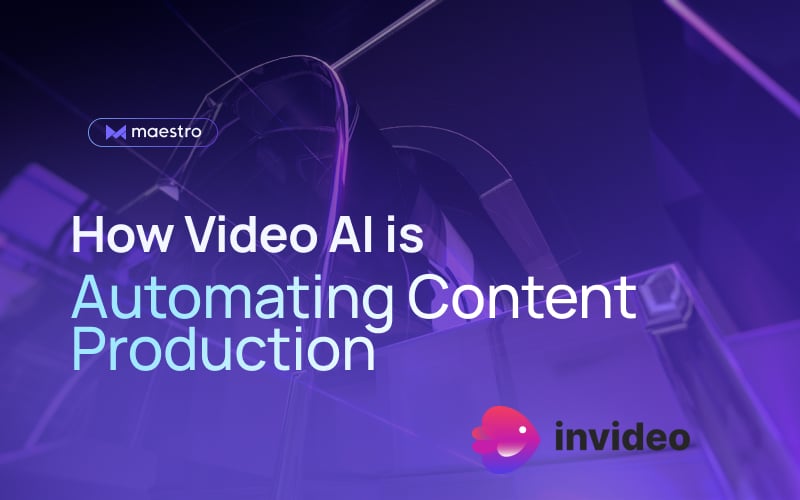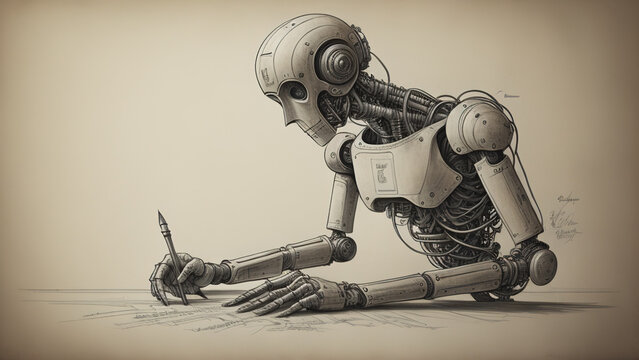From Script to Screen: How Video AI is Automating Content Production

Content creation has come a long way. Today, one person can now produce good-quality videos with a camera or smartphone and basic editing skills.
In the past, the same would required an army of specialists to do. That said, with all the latest tech at one's disposal, it is a challenging task that requires a lot of time and resources to script, film, edit, and publish.
Video AI is a technology that can overcome all of the above challenges in one fell swoop. Simply put, it is the application of artificial intelligence (AI) to automate and enhance various aspects of content production.
In this guide, we will discuss how video AI simplifies content production, from script to screen, without the need for several specialists.
Table of Contents
- The Rise of Video AI in Content Creation
- How Video AI Works
- Benefits of Video AI for Content Producers
- Challenges with Video AI
- Implementing Video AI in Production
- The Future of Content Production with Video AI
The Rise of Video AI in Content Creation

Contrary to popular belief, AI video generation is not a recent concept. You can trace the origins of this technology to the 1960s and 1970s, when it was capable of creating simple graphics and animation.
Between the 1980s and 2000s, neural networks improved and allowed for more complex visual content to be created.
This led to the development of deep learning, Convolutional Neural Networks (CNNs), and Generative Adversarial Networks (GANs) in the following years. As a result, video AI can now generate videos with mind-boggling realism.
MidJourney, Stable Diffusion, and Open AI's Dall-E and Sona are a few of the most popular names in this niche today. AI in the video production space is estimated to grow at an expected CAGR of 22.37% by 2028.
How Video AI Works
Video AI works by applying various AI techniques and algorithms to different stages and aspects of content production. Some of the common applications of video AI include:
- Script Generation: Video AI can help content creators generate scripts based on keywords, topics, or end goals given to them. This technology can also analyze and provide suggestions for improvement.
- Video Editing: AI-based video editing apps, can help content creators edit their videos faster. It can also add transitions and generate captions and sound effects to the videos in a fraction of the time it would take to do manually.
- Video Optimization: Video AI can optimize videos for different platforms and devices. It can do this by adjusting resolution, bitrate, format, and quality. This technology can also assist with localization to reach a wider audience.
- Video Generation: Video AI can help content creators generate new videos from scratch or existing content. Video AI can synthesize realistic images, animations, and scenes based on the script, keywords, or images.
Benefits of Video AI for Content Producers
Here are a few of the top benefits of using video AI for content production.
Drastic Reduction of Production Times
Video AI can make tasks like scripting, filming, and editing faster and easier. This frees up time and energy for content creators and marketers to focus on strategy and creativity in content production.
Reduction of Production Costs
With most tasks now automated, content creators can work with smaller teams and minimal equipment. A move that will result in a significant reduction in overhead costs. That said, InVideo AI's free plan caters to creators on a budget, offering access to a robust suite of video creation and editing tools without the financial commitment.
This democratizes access to advanced video AI technology, allowing even beginners to produce professional-quality content effortlessly.
Access AI-powered Suggestions and Insights
AI can do certain things better than humans. It can offer insights and suggestions using data to help generate content ideas. Video AI can also inspire content creators to explore new ideas, formats, and styles for their content.
In addition, AI can streamline event planning processes by automating repetitive tasks and providing predictive analytics to optimize logistics and the event experience.
Challenges of Video AI
As advanced and impressive Video AI is in its current state, the use of this technology does bring a few challenges, such as:
- Ethical and Legal Concerns: AI learns from existing content, and as a result, it sometimes replicates original content. Malicious individuals have been misusing this technology to create deepfakes.
- Lacks the Human Factor: Video AI can't replace human creativity, judgment, and intuition. It is a technology that can augment and assist human content creators but not replace them.
- Quality and Diversity: Video AI tends to make low-quality or repetitive content, especially if it is based on limited or biased data. This technology also lacks the nuance, emotion, and context that human content creators can provide.
Content creators can overcome the above challenges by following best practices and understanding this technology's limitations.
Implementing Video AI in Production
Implementing video AI into your content production workflow is a straightforward process. Here's how you can do so:
- Define Your End Goal: To implement Video AI, first decide how and where you will use this technology to fit into your production workflow.
- Pick the Right Tools for the Job: There are several Video AI tools available to choose from. Pick one that specializes in various aspects of content production.
- Experiment, Analyze, and Adapt: You may not get everything right one go, see what software or tools work best for you. Experiment with each of their setting and parameters to see if their output fulfills your expectations.
- Seek Feedback and Support: Implementing any new technology comes with a learning curve. Join online communities or reach out to experts in the field to see how to get the best out of these tools to optimize your content production process.
The Future of Content Production with Video AI
Based on the current trajectory, video AI is here to stay.
As the technology matures and its adoption becomes widespread, it will become affordable. Its AI element will help content creators in making personalized and relevant content.
This, in turn, will also help boost their bottom line. That said, one must not forget that this tech has limits and flaws and does and will need human oversight.
Summing It Up
Video AI is a technology that holds tremendous potential. This is true, especially in this digital era, where videos reign supreme as the preferred format.
As with every piece of technology, it needs to be used with caution for the benefit of all parties involved. That said, when used correctly, it opens up a world of possibilities for content production.
Interested in exploring the power of Video AI for your content creation? Check out Maestro, an end-to-end streaming platform that enables you to monetize your video content with interactive streaming.
About the Author
Ankit Solanki is a tech investor who loves finding promising tech startups and helping them grow. One of his portfolio companies, Invideo, took a risk and offered me a playground to test my skills and expertise in building startups. When I’m not busy growing the company, you’ll find me writing about tech, Artificial Intelligence, growth, and investing – and sometimes, sneaking in a game of soccer.